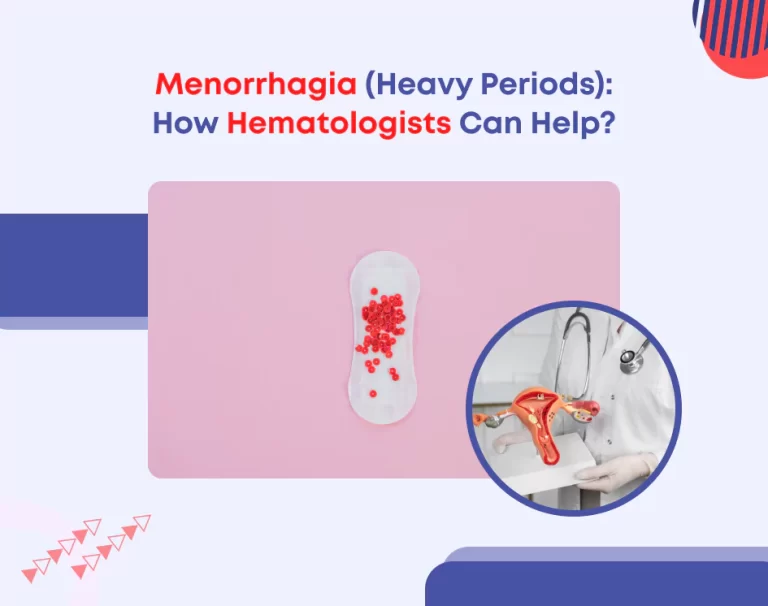
Menorrhagia (Heavy Periods): How Hematologists Can Help?
Menorrhagia, commonly known as heavy menstrual bleeding, is a condition that affects millions of women worldwide. While occasional heavy periods can be normal, persistent excessive bleeding can indicate an underlying health issue that requires medical intervention.
A hematologist, a specialist in blood disorders, plays a crucial role in diagnosing and treating conditions that contribute to menorrhagia. This blog explores how hematologists can help manage heavy periods effectively.
What is Menorrhagia?
Menorrhagia is characterized by excessive menstrual bleeding that lasts more than seven days or involves losing more than 80ml of blood per cycle. Some common symptoms include:
- Changing sanitary products every hour
- Passing large blood clots
- Experiencing fatigue, dizziness, or shortness of breath
- Bleeding that disrupts daily activities
If left untreated, menorrhagia can lead to anemia and significantly impact a woman’s quality of life.
Causes of Menorrhagia
Several factors can contribute to heavy periods, including:
- Hormonal Imbalances – Conditions like polycystic ovary syndrome (PCOS) and thyroid disorders can disrupt normal hormone levels.
- Uterine Fibroids and Polyps – Non-cancerous growths in the uterus can cause excessive bleeding.
- Bleeding Disorders – Conditions such as Von Willebrand disease or platelet function disorders can lead to prolonged bleeding.
- Certain Medications – Blood thinners, anticoagulants, and anti-inflammatory drugs may contribute to heavier periods.
- Endometriosis and Adenomyosis – These conditions cause the endometrial tissue to grow outside the uterus, leading to severe bleeding and pain.
When to See a Hematologist?
A hematologist specializes in blood-related disorders and can be instrumental in diagnosing and managing menorrhagia, especially if there is a suspicion of an underlying bleeding disorder. Women who experience the following should consider consulting a hematologist:
- Unexplained heavy bleeding since puberty
- Family history of bleeding disorders
- Easy bruising, frequent nosebleeds, or prolonged bleeding after minor cuts
- Low blood platelet count or clotting issues
How Hematologists Diagnose Menorrhagia
A hematologist performs a series of tests to determine the cause of heavy bleeding:
Complete Blood Count (CBC) – Evaluates hemoglobin levels to check for anemia.
Coagulation Tests – Includes PT, APTT, and fibrinogen levels to assess blood clotting ability.
Von Willebrand Factor Assay – Tests for Von Willebrand disease, a common inherited bleeding disorder.
Iron Studies – Determines iron deficiency due to excessive blood loss.
Genetic Testing – Identifies inherited bleeding disorders that may contribute to menorrhagia.
Treatment Options for Menorrhagia
Once the underlying cause is identified, hematologists work with gynecologists to develop an effective treatment plan. Some treatment options include:
1. Medications
- Iron Supplements – To manage anemia caused by blood loss.
- Hormonal Therapy – Birth control pills, hormonal IUDs, or progesterone therapy can regulate periods.
- Antifibrinolytic Drugs – Medications like tranexamic acid help reduce blood loss by stabilizing blood clots.
- Desmopressin (DDAVP) – Used for patients with mild bleeding disorders to boost clotting factors.
2. Lifestyle Changes
- Maintaining a balanced diet rich in iron, folic acid, and vitamin B12.
- Regular exercise to regulate hormonal balance.
- Managing stress, as anxiety can exacerbate hormonal fluctuations.
3. Advanced Medical Procedures
- Endometrial Ablation – Removes or destroys the uterine lining to reduce bleeding.
- Uterine Artery Embolization – Used for fibroids to shrink excessive tissue.
- Hysterectomy – In severe cases, complete removal of the uterus may be considered.
Preventing Complications
Hematologists emphasize the importance of early diagnosis and treatment to prevent long-term complications such as severe anemia, chronic fatigue, and reduced quality of life. Regular medical checkups, iron supplementation, and proper lifestyle management can significantly improve symptoms.
Conclusion
Menorrhagia can be distressing and affect daily life, but with the right medical guidance, it can be effectively managed. Hematologists play a crucial role in diagnosing and treating bleeding disorders associated with heavy periods. If you experience persistent heavy menstrual bleeding, seek a consultation with us.








